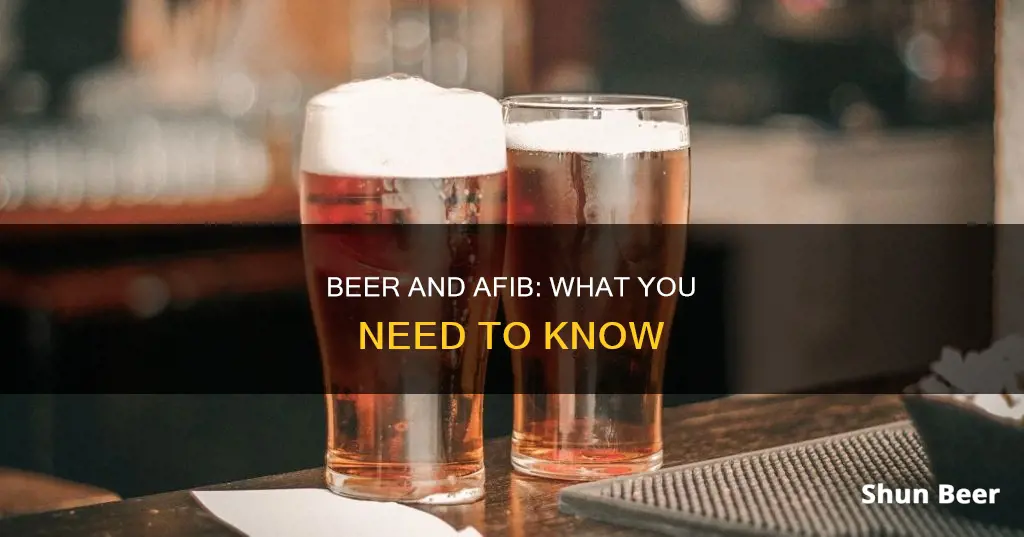
Drinking alcohol can increase the risk of atrial fibrillation (AFib), a condition that causes a person's heart to beat rapidly and irregularly. While past studies have suggested some heart benefits of moderate drinking, research has not shown a definitive link between alcohol and improved heart health. In fact, drinking alcohol daily can raise your chances of getting AFib, as alcohol is believed to disrupt the heart's natural pacemaker.
So, can you drink beer if you have AFib?
What You'll Learn

The effects of beer on those with AFib are not clear
Research has shown a link between alcohol consumption and an increased risk of AFib. One study found that even a single drink per day was associated with a 16% higher risk of developing AFib compared to not drinking at all. Another study, which included 100 patients with AFib, found that a single drink doubled the odds of an AFib episode within the next four hours, and this risk increased threefold with two or more drinks. However, the specific effects of beer on AFib are not explicitly mentioned in these studies, which refer to alcoholic drinks in general.
The mechanism by which alcohol triggers AFib episodes is believed to be related to the disruption of the heart's natural pacemaker, the electrical signals that control the heart's rhythm. Additionally, studies have shown that heavy drinking over a short period, also known as binge drinking or "holiday heart syndrome," can trigger AFib episodes. This phenomenon is often observed during holidays when people tend to overindulge in alcohol.
While the research suggests a link between alcohol and AFib, the specific effects of beer, particularly in moderate amounts, are not clear. It is always advisable to consult with a doctor to determine what amount, if any, of alcohol is safe to consume for individuals with AFib, as it can vary from person to person.
Beer After Food Poisoning: Is It Safe?
You may want to see also

Alcohol can trigger AFib symptoms
Drinking alcohol can trigger symptoms of AFib, such as heart palpitations. Research shows that drinking alcohol may put a person at greater risk for developing AFib in the first place. According to a study published in the Journal of the American College of Cardiology, the best way to avoid the risk of AFib is to avoid alcohol completely.
Even small amounts of alcohol can make a difference. One study found that even a single drink per day was linked to a 16% higher risk of developing AFib compared with not drinking at all. This is because alcohol can disrupt the heart's natural pacemaker—the electrical signals that are supposed to keep it beating at the right pace.
For people who already have AFib, alcohol appears to have an almost immediate effect on their heart rhythm. A recent study found that a single drink doubled the odds of an AFib episode occurring within the next four hours. Having more than one glass tripled the risk. The research also found that for every 0.1% increase in a person's blood alcohol level, their risk of having an AFib episode increased by 40%.
Binge drinking, or consuming large amounts of alcohol in a short time, can also trigger AFib symptoms. Doctors refer to this as "holiday heart" because they see more cases around holidays when people are more likely to overindulge in alcohol.
If you have AFib, it's important to talk to your doctor about your health history and determine what amount of alcohol, if any, is safe for you.
Beer and Hepatitis B: What You Need to Know
You may want to see also

Binge drinking and AFib don't mix
Binge drinking, or consuming more than five drinks in a row, is a known trigger for AFib symptoms. The condition, which causes a rapid, irregular heartbeat, can lead to blood clots, strokes, heart failure, and other heart conditions.
Research has found that even a single drink of beer, wine, or spirits per day was linked to a 16% higher risk of developing AFib compared to not drinking at all. This risk increases with every drink consumed in a single sitting. For instance, a study found that having more than one drink tripled the risk of an AFib episode within the next four hours.
For those already suffering from AFib, alcohol can have an almost immediate effect on their heart rhythm. A study found that a single drink doubled the odds of an AFib episode within the next four hours, and this risk increased threefold for those consuming two or more drinks.
The exact mechanism by which alcohol affects the heart is not yet fully understood. However, doctors believe that alcohol disrupts the heart's natural pacemaker, the electrical signals that are supposed to keep it beating at the right pace.
While moderate drinking may be okay for some, it's important to note that the risk of AFib increases with every drink. If you have AFib or are at risk of developing it, it's best to avoid alcohol or limit yourself to an occasional drink on special occasions.
Beer and Zyrtec: Is It Safe to Mix?
You may want to see also

Moderate drinking may be okay for some
While drinking alcohol can increase the risk of developing Atrial Fibrillation (AFib), a condition that causes a rapid and irregular heartbeat, and is linked to heart failure, strokes, and other heart conditions, moderate drinking may be okay for some.
Health experts agree that heavy drinking and AFib don't mix. However, this doesn't mean that a person at risk for AFib or who already has the condition can never drink alcohol again. Moderate drinking, defined as no more than one drink per day for women and no more than two drinks per day for men, may be acceptable for some individuals.
The benefits of moderate alcohol consumption have been debated, with some studies suggesting that it can reduce the risk of heart disease. However, when it comes to AFib, even moderate drinking can increase your risk. A study published in the European Heart Journal found that compared to teetotallers, just one alcoholic drink per day was linked to a 16% increased risk of AFib over a 14-year period. Another study in the Canadian Medical Association Journal (CMAJ) found that moderate drinking increased the risk for AFib by about 14% in people over 55 who had heart disease or diabetes.
It's important to note that the risk of AFib increases significantly with every drink consumed in a single sitting. A study presented at the American College of Cardiology's Annual Scientific Session found that just one glass of wine, beer, or another alcoholic beverage doubled the odds of an AFib episode within the next four hours. Having more than one glass tripled the risk.
So, while moderate drinking may be okay for some individuals, it's crucial to understand the risks associated with alcohol consumption and AFib. If you have AFib or are at risk for it, it's essential to talk to your doctor about your individual risk factors and determine what amount of alcohol, if any, is safe for you.
Stone Cold Steve Austin's Beer of Choice
You may want to see also

Alcohol may increase the risk of AFib
Drinking alcohol is linked to an increased risk of developing AFib. Research shows that even small amounts of alcohol can make a difference. One study found that a single drink per day was linked to a 16% higher risk of AFib compared to not drinking at all. The risk increases with the amount of alcohol consumed, with two drinks a day associated with a 28% increased risk and more than four drinks a day associated with a 47% increased risk.
The exact mechanisms by which alcohol increases the risk of AFib are not fully understood. However, it is believed that alcohol disrupts the heart's natural pacemaker, the electrical signals that keep the heart beating at the right pace. This can lead to a rapid, irregular heartbeat, known as AFib, which can have serious health consequences, including blood clots, strokes, and heart failure.
The link between alcohol and AFib is particularly strong for people who already have AFib. One study found that a single drink doubled the odds of an AFib episode occurring within the next four hours. The risk increased threefold for those having two or more drinks. Additionally, for every 0.1% increase in blood alcohol level, there was a 40% higher odds of an AFib episode.
While moderate drinking may be okay for some people, it is important to weigh the risks and consider individual health history. Heavy drinking and binge drinking are especially dangerous and can trigger AFib symptoms such as heart palpitations. For those with AFib, it is crucial to avoid alcohol as it can trigger symptoms and increase the risk of serious health complications.
Overall, the evidence suggests that reducing alcohol consumption may be crucial for lowering the risk of AFib and maintaining heart health.
Kayaking and Drinking Beer in Pennsylvania: What's Legal?
You may want to see also
Frequently asked questions
Health experts agree that heavy drinking and AFib don't mix. Alcohol can trigger AFib symptoms such as heart palpitations. Research shows that drinking alcohol may put a person at greater risk of developing AFib. If you have AFib, it is best to avoid drinking alcohol as it can trigger your symptoms.
There are no hard-and-fast AFib guidelines on how much alcohol is safe to drink. If you have AFib and alcohol triggers your symptoms, don't drink. Remember that moderate drinking equals no more than one drink per day for women and no more than two drinks per day for men.
Drinking alcohol can significantly increase the chance of an AFib episode occurring within a few hours. The more alcohol consumed, the higher the risk. Research has shown that even a single drink per day was linked to a 16% higher risk of developing AFib compared to not drinking at all.
AFib is a condition where the heart beats in an abnormal rhythm. It can cause shortness of breath, near-fainting spells, or a sensation that the heart is beating out of control. AFib can lead to blood clots, strokes, heart failure, and other heart conditions.







